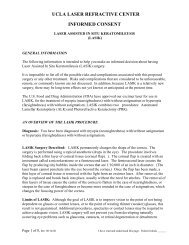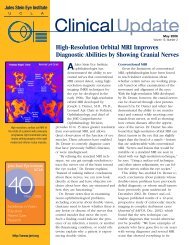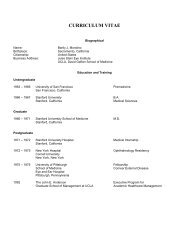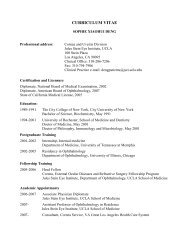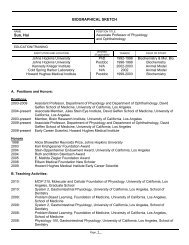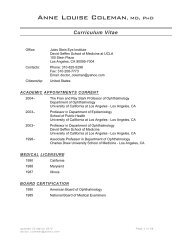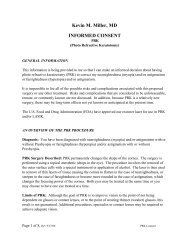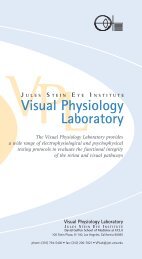View Annual Report - Jules Stein Eye Institute
View Annual Report - Jules Stein Eye Institute
View Annual Report - Jules Stein Eye Institute
Create successful ePaper yourself
Turn your PDF publications into a flip-book with our unique Google optimized e-Paper software.
72 Faculty<br />
michael D. Olson, OD, PhD<br />
Associate Research Ophthalmologist<br />
ReseaRch summaRy<br />
Comprehensive Ophthalmology<br />
Dr. Olson’s research activities focus on the visual and<br />
surgical outcomes following cataract surgery. This<br />
includes the surgical correction of refractive errors,<br />
evaluating the safety and efficacy of specialty use<br />
ocular implants, and functional visual outcomes following<br />
ocular trauma cases and complicated cataract<br />
surgery. He is currently investigating three iris implants:<br />
the HumanOptic Artificial Iris, which is a customized,<br />
handmade color match of the patient’s fellow eye;<br />
Morcher GmbH aniridia implants; and the Ophtec<br />
Reconstruction Lens for the treatment of eyes with<br />
congenital aniridia, acquired iris defects, or complete<br />
aniridia. He is also investigating a unique intraocular<br />
lens whose power can be modified after implantation,<br />
correcting the residual refractive error, both spherical<br />
and astigmatic, to improve uncorrected visual acuity.<br />
maria carolina Ortube, mD<br />
Assistant Research Ophthalmologist<br />
Clinical Director of Research Studies,<br />
Retinal Disorders and Ophthalmic Genetics Division<br />
ReseaRch summaRy<br />
Ocular Genetics<br />
Dr. Ortube is a fellowship-trained specialist in pediatric<br />
ophthalmology, strabismus, and pediatric genetic conditions.<br />
She is an investigator in four clinical and translational<br />
research projects related to ocular genetics.<br />
The genetics of inherited eye disorders and Stargardt<br />
protocols provide clinical characterization of affected<br />
individuals and at-risk family members. The Genetics<br />
of Age-Related Maculopathy study focuses on the<br />
genetic and environmental risk factors that contribute<br />
to age-related maculopathy. The protocols use state-ofthe-art<br />
imaging and functional technologies in conjunction<br />
with molecular genetic testing to identify causative<br />
genes and mutations. Dr. Ortube has a special interest<br />
in children born with craniofacial ocular disorders.<br />
She is also investigating a simple, noninvasive, rapid<br />
method for widespread screening of diabetics using the<br />
pupillary light reflex. This study aims to identify those<br />
who may require medical attention and/or therapy for<br />
diabetic retinopathy. Dr. Ortube is a co-investigator in<br />
collaborative research efforts with the University of<br />
Pittsburgh and Neurokinetics, Inc.<br />
Roxana a. Radu, mD<br />
Associate Research Ophthalmologist<br />
ReseaRch summaRy<br />
Retinoids Metabolism in the <strong>Eye</strong><br />
and Underlying Mechanisms of<br />
Macular Degeneration<br />
Dr. Radu’s research focuses on the visual cycle and<br />
underlying biochemical and molecular mechanisms of<br />
macular degeneration. She studies the in vivo association<br />
of the complement negative regulator genes and<br />
age-related macular degeneration (AMD) development.<br />
The mechanism by which dysfunction of complement<br />
factor H (CFH, one of the complement regulatory<br />
genes) causes AMD is not known. To investigate the<br />
relationship between abnormal build-up of vitamin A-<br />
based toxic compounds such as A2E and the complement<br />
system, Dr. Radu will generate a mouse lacking<br />
both genes ABCA4 and CFH. This complex mouse<br />
genetic model will advance understanding of the<br />
relationship between lipofuscin accumulation, complement<br />
activation, and photoreceptor degeneration in<br />
AMD, and it will be a valuable tool for developing new<br />
treatments for this disease.<br />
Kiyo sakagami, PhD<br />
Assistant Research Ophthalmologist<br />
ReseaRch summaRy<br />
Hedgehog Signaling and PTEN/PI3K<br />
Signaling on Retinal Development<br />
Dr. Sakagami’s research aims to understand how<br />
extracellular signals coordinate retinal cell fate and<br />
behavior during development, using genetic strategies<br />
for conditional mutagenesis in the mouse. The more<br />
specific goals of her research are to understand how<br />
hedgehog signaling regulates bHLH genes to determine<br />
cell cycle and cell fate decisions and to investigate<br />
the potential role of PTEN/PI3K signaling on<br />
retinal formation.




